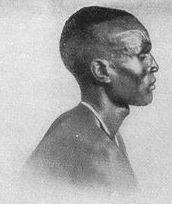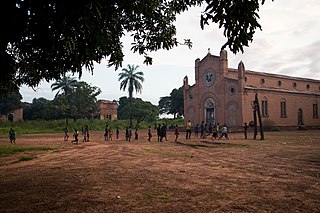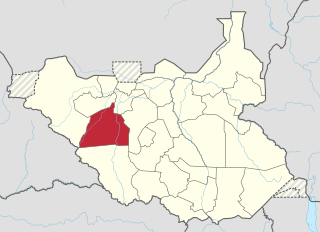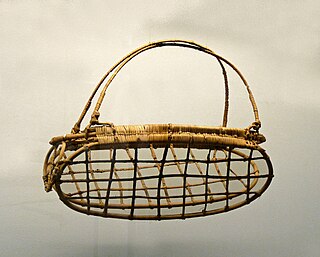Related Research Articles

Western Bahr el Ghazal is a state in South Sudan. It has an area of 93,900 km2 (36,255 sq mi) and is the least populous state in South Sudan, according to the controversial Sudanese census conducted in 2008. It is part of the Bahr el Ghazal region. Its capital is Wau. The state shared international borders with Sudan to the north and the Central African Republic to the west. The portion now occupied by Raga County is the southern part of the historical region known as "Dar Fertit".

Northern Bahr el Ghazal(Arabic: ولاية شمال بحر الغزال) is a state in South Sudan. It has an area of 30,543 km2 and is part of the Bahr el Ghazal region. It borders East Darfur in Sudan to the north, Western Bahr el Ghazal to the west and south, and Warrap and the disputed region of Abyei to the east. Aweil is the capital of the state.

The Dinka people are a Nilotic ethnic group native to South Sudan. The Dinka mostly live along the Nile, from Mangalla-Bor to Renk, in the region of Bahr el Ghazal, Upper Nile, and the Abyei Area of the Ngok Dinka in South Sudan.

Wau is a city in northwestern South Sudan, on the western bank of the Jur River, that serves as capital for Western Bahr el Ghazal. It lies approximately 650 kilometres (400 mi) northwest of the capital Juba. A culturally, ethnically and linguistically diverse urban center and trading hub, Wau is also the former headquarters of Western Bahr el Ghazal.
Dār Fertit is a historical term for the lowlands south of Darfur and east of the highlands in the east of the modern-day Central African Republic that contain tributaries of the White Nile River. This region included parts of southwestern Sudan and northwestern South Sudan. In the present era, Fertit is a catch-all word for non-Dinka, non-Arab, non-Luo, non-Fur groups and tribes in Western Bahr el Ghazal, South Sudan. Even though these groups often speak different languages and have a history of inter-tribal violence, they have become more unified over time, mostly out of opposition to the Dinka people.
Ngulgule is an ethnic group of South Sudan living in Western Bahr el Ghazal just north of the confluence of the Sopo and Boro rivers. They are one of seven distinct ethnicities comprising the Daju people. They speak Njalgulgule, a Nilo-Saharan language. Most of them are Muslims. The population of this group is 900.

Deim Zubeir, from the Arabic ديم الزبير ["Daim az-Zubayr"], commonly translated as the "Camp of Zubeir", is the historically established but highly controversial name of Uyujuku town in the Western Bahr el Ghazal of the Republic of South Sudan, located in the Western Bahr El Ghazal part of the country, some 70 km from the border with the Central African Republic (CAR), near the Biri tributary of the River Chel.

Bentiu, also spelled Bantiu, is a city in South Sudan and capital of the state of Unity State.

Bahr al-Arab is a river which flows approximately 800 kilometres (500 mi) through the southwest of Sudan and marks part of its international border with South Sudan. It is part of the Nile river system, being a tributary of Bahr el Ghazal, which is a tributary of the White Nile.

Aweil is a city in South Sudan and the capital of the Northern Bahr el Ghazal.

The Jur River is a river in western South Sudan, flowing through the Bahr el Ghazal and Equatoria regions. About 485 kilometres (301 mi) long, it flows north and northeast, joining the Bahr el Ghazal River on the western side of the Sudd wetlands. The Jur River is part of the Nile basin, as the Bahr al-Ghazal flows into the White Nile.

The Sultanate of Darfur was a pre-colonial state in present-day Sudan. It existed from 1603 to 24 October 1874, when it fell to the Sudanese warlord Rabih az-Zubayr, and again from 1898 to 1916, when it was occupied by the British and the Egyptians and was integrated into Anglo-Egyptian Sudan. At its peak in the late 18th and early 19th century it stretched all the way from Darfur in the west to Kordofan and the western banks of the White Nile in the east, giving it the size of present-day Nigeria.

South Sudan is home to around 60 indigenous ethnic groups and 80 linguistic partitions among a 2021 population of around 11 million. Historically, most ethnic groups were lacking in formal Western political institutions, with land held by the community and elders acting as problem solvers and adjudicators. Today, most ethnic groups still embrace a cattle culture in which livestock is the main measure of wealth and used for bride wealth.
Ethnic violence in South Sudan has a long history among South Sudan's varied ethnic groups. South Sudan has 64 tribes with the largest being the Dinka, who constitute about 35% of the population and predominate in government. The second largest are the Nuers. Conflict is often aggravated among nomadic groups over the issue of cattle and grazing land and is part of the wider Sudanese nomadic conflicts.
The Luwo are a Nilotic ethnic group that live in the western parts of South Sudan. They are part of a larger group of ethno-linguistically related Luo peoples of East Africa. They speak the Luwo language which is a Northern Luo language.
The 2014 Bentiu massacre occurred on 15 April 2014 in the town of Bentiu, in the north of South Sudan, during the South Sudanese Civil War. The attack has been described by The Economist as the "worst massacre" of the civil war.

Raga County is a county in Western Bahr el Ghazal, South Sudan. It is the largest county in the nation. In Arabic, Raga County can be known as "Raja".

Wau State was a state in South Sudan that existed between 2 October 2015 and 22 February 2020. It was located in the Bahr el Ghazal region, and was part of the former state of Western Bahr el Ghazal. Wau State bordered Aweil State, Gbudwe State, Gogrial State, Lol State, and Tonj State.
The 2014 retreat from Western Bahr el Ghazal, also called the long march north, was an unorganized withdrawal by hundreds of Nuer Sudan People's Liberation Army (SPLA) deserters who sought to flee from Bahr el Ghazal to Sudan during the South Sudanese Civil War. After longstanding tensions between SPLA soldiers belonging to the Dinka and Nuer ethnic groups escalated on 25 April 2014, leading to a massacre of Nuer soldiers at Mapel in Western Bahr el Ghazal, a large number of Nuer SPLA soldiers deserted to escape ethnic prosecution and loyalist SPLA forces. Though some deserters joined SPLM-IO rebels or surrendered to the government, a large number of them marched northward, joined by other SPLA defectors from Northern Bahr el Ghazal. After covering over 400 kilometres (250 mi), this trek eventually arrived in Sudan on 4 August 2014, where they were disarmed.

The Barambu are an ethnic group who live in the northeast of the Democratic Republic of the Congo.
References
- 1 2 Gurtong Peace Project
- ↑ Guanche Pérez, Jesús; Corral Barrero, Carmen María (2019). África. Diccionario etnográfico. Tomo I (in Spanish). ISBN 9789590622748.